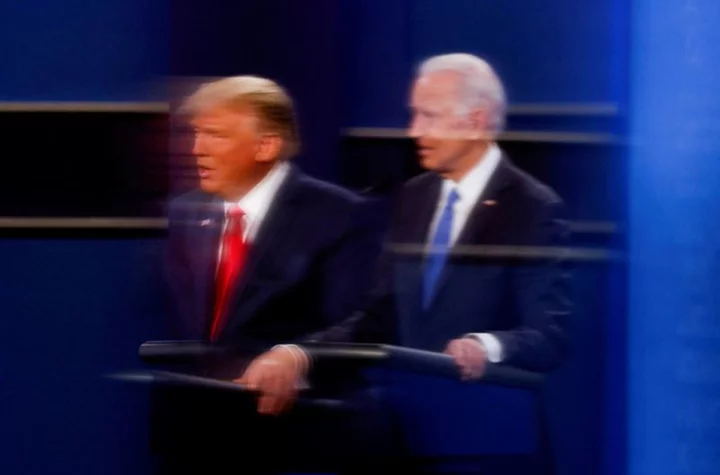By Mike Dolan
LONDON Thirteen months is often too distant an horizon for financial markets to focus on, but uncertainties surrounding 2024's U.S. Presidential election are becoming difficult to screen out.
A split Congress is at loggerheads again over government funding just as U.S. bond markets are pricing the most expensive Treasury borrowing in 16 years while also rethinking the long-term trajectory for interest rates and fiscal policy.
A near-miss on a debt ceiling showdown in the Spring led to the loss of another Triple-A sovereign credit rating. And it's been followed by further brinkmanship over next year's spending bills - which almost shut down government operations last weekend and whose stopgap solution just kicked the can to November 17.
According to a recent warning from Moody's, the dysfunction in public financing and potential for debt servicing disruption may threaten the last remaining AAA credit rating of the main three agencies.
All is cut and thrust in a polarized political world, some might argue.
But any prospect of fiscal peace emerging for years hence is already challenged by opinion polls showing former Republican President Donald Trump neck and neck with incumbent Democrat Joe Biden in a hypothetical runoff for 2024's White House race.
Some overseas betting markets even have Trump down as narrow favourite to win - despite multiple legal battles over his own business dealings and indictments over his efforts to undermine the outcome of the 2020 election he lost to Biden.
While neither's candidacy will be formalised until next summer, both are clear favourites to represent the two parties.
And while rivers of legal, political and economic water will flow under the bridge before we get there, there's a growing sense of inevitability about a re-run of the 2020 race.
While pandemic upheavals affected both presidents, Biden's approval ratings have yet to benefit from the resilience of the economy since then. Near full employment and the prospects of a 'soft landing' for the economy still seem overshadowed by an inflation spike and high interest rates.
And, alongside last year's Russia-Ukraine related energy shock, the scale of post-pandemic public spending is blamed by many on both sides of the political spectrum for exaggerating an inflation resurgence of the past two years.
But it's the potential return of Trump which bamboozles most thinking, particularly overseas, about what might happen next.
Trump factions in Congress have repeatedly used swing votes to trigger this year's funding hiatuses - favouring draconian spending cuts, migration curbs and a breaking of standing international alliances such as cutting funding for Ukraine.
What's more, another re-set of world relations at a time of extreme geopolitical stress seems incalculable for many international analysts - not to mention the prospect of about turns on climate policies and many unanswered questions about the democratic process itself.
"A Trump victory in 2024 would be nothing less than catastrophic for the U.S. and for the world," claimed Unicredit's Chief Economic Advisor Erik Nielsen this weekend.
Many within the United States clearly disagree.
But what's not in doubt is the extremes of political and policy options on the menu and - given the polls - difficulty deciphering what American economic or political policy might look like in 13 months, or indeed in five years time.
GIRDING FOR GRIDLOCK
Financial markets are rarely inclined to price hypotheticals this far from a major risk event. Just comparing the raw economic growth or market performance of the two politicians' terms in office is overly distorted by the pandemic.
Hedge fund manager Stephen Jen at Eurizon SLJ reckons much of rancorous disagreement between the two sides domestically is on issues of equality and areas covered by environment, social and governance issues. And financial markets may well just "key off" some resumption of Trump's "America first" economic agenda that pushes tax cuts and lift U.S. asset prices that way.
But even if it's offset by spending cuts, that approach wouldn't necessarily address the issue du jour currently upending U.S. markets - namely a blistering rise in long-term borrowing rates due to growing assumptions of a 'high pressure' economy for years alongside rising primary budget gaps and debt piles.
And Jen acknowledges any policy guesswork hinges on the makeup of Congress - where, if the national divide on the Presidential race is anything to go by, it looks likely to remain split along current dysfunctional battle lines.
"The balance of Congress will determine how well President Trump or Biden could project his power," he said.
And so the awkward standoff on government finances, deficits and debt many simply persist a lot longer - and at an increasingly worrying time for bond markets.
Goldman Sachs on Tuesday said rising Treasury borrowing costs and discord in Congress have raised renewed questions about U.S. debt sustainability - lifting its assumption of interest expense on government debt to 3% of national output by 2024 and 4% by 2030, surpassing the early 1990s peak by 2025.
On that basis, the U.S. bank increased its 2024 budget deficit forecast out to 2025 by $100 billion to $1.9 trillion - or 6.5% of GDP.
But Goldman pointed out that when debt servicing costs spiked like this in the 1980s, government shrank the primary deficit, which excludes interest expense, to offset it. A fiscal adjustment akin to the one enacted in 1993 would be enough to do that again over 5 years.
"However, this looks unlikely anytime soon given congressional gridlock, a lack of political attention to deficit reduction and the upcoming 2024 election," it concluded.
On current poll readings at least, next year's election will do nothing to end the fiscal war. For investors grappling with long-term bond yield uncertainty and re-emerging risk premia embedded in them, the picture looks unnerving to say the least.
The opinions expressed here are those of the author, a columnist for Reuters.
(Editing by William Maclean)

